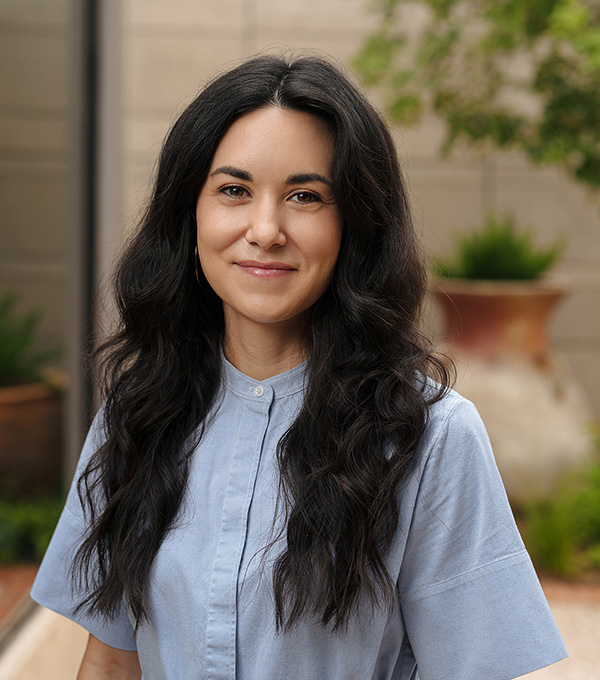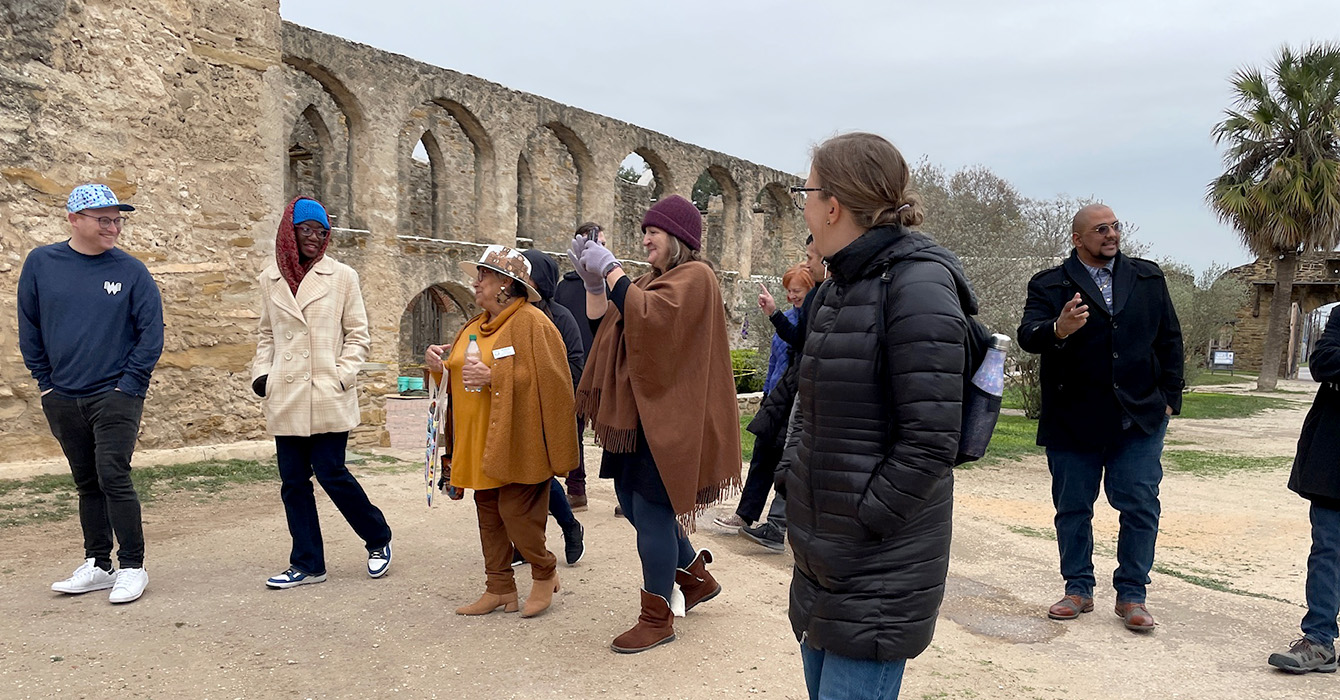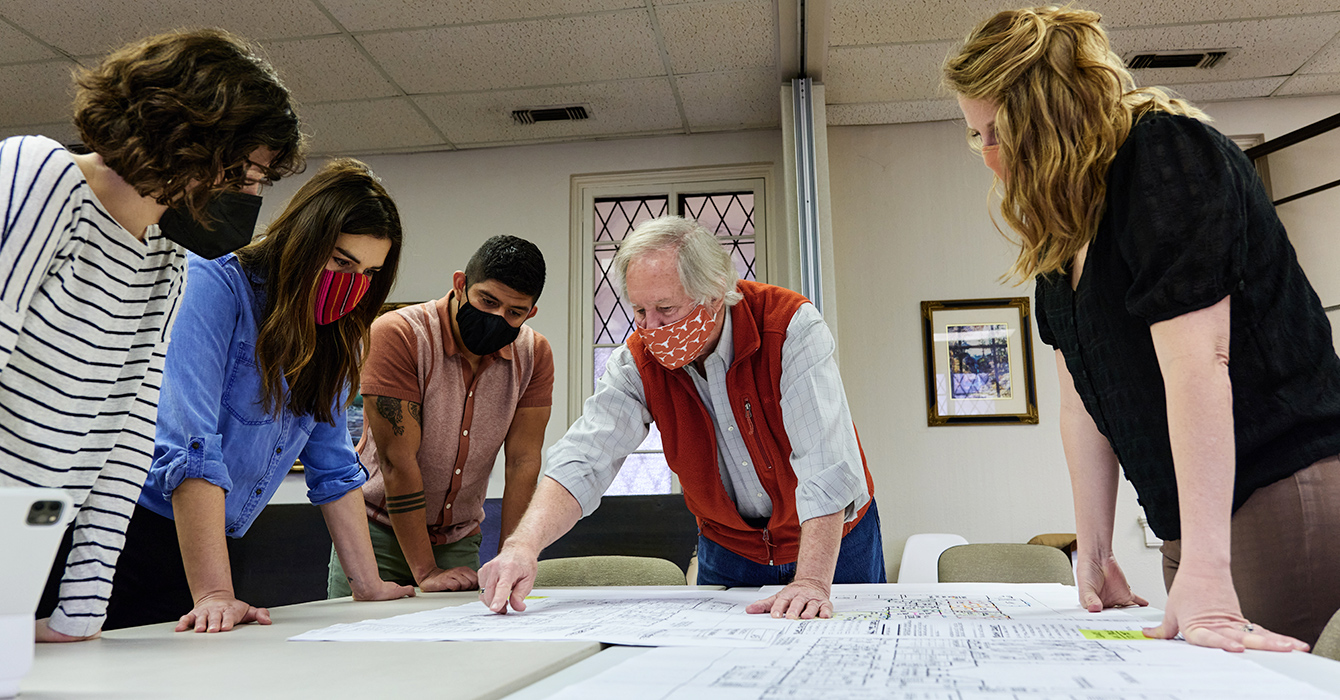When people hear Elizabeth Le'anani Coffee’s title as director of storytelling at the H.E. Butt Foundation, some are confused.
“People ask me if I read books to children. And while that is a noble cause, it’s not what I do!” Coffee said.
What Coffee actually does is help foster narrative change in San Antonio, through both collaboratively made media and cohorts that engage in dialogues across the city.
The media is published at knowyourneighbor.com, where different pieces of San Antonio’s life are showcased through blog posts, profiles and videos. The cohorts are intentionally made groups of people who meet over the course of 15 months, learning how to better listen to the needs of San Antonio. Coffee also serves as an advisor to Leadership Education at Duke Divinity.
Listening is key for Coffee’s approach to equitable storytelling. She points to social workers and educators who have taught her that “just paying attention to folks is really critical.”
Coffee spoke with Faith & Leadership’s Chris Karnadi about her work in San Antonio and how letting sources have power over their stories can be less efficient but more ethical. The following is an edited transcript.
Faith & Leadership: What do you do as a director of storytelling?

Elizabeth Le'anani Coffee: Our storytelling program is focused on the role that narrative change plays as a response to social, racial and economic inequity in San Antonio, specifically.
We have a very traditional storytelling platform, a website called knowyourneighbor.com, where we put blog posts, documentaries, other learning resources online for people to engage with and understand more about — for instance, housing affordability or the benefits cliff or the history of deed restrictions in San Antonio.
But we also interpret story really liberally and say that while those are important tools to the work of narrative change, true narrative change doesn’t happen unless we’re able to embody storytelling, meaning literally being at tables dialoguing with one another about each other’s version of this city. And so we host convenings and we create content all around narrative change focused on social, racial and economic inequities in the city.
F&L: What is the philosophy for that type of work?
ELC: The belief is that storytelling is a predominant vehicle for change and for maintaining realities, or perpetuating realities. We all tell ourselves stories for various reasons. We inherit stories, and then those stories shape who we become, and who we are and what we do shapes our communities.
Whether it’s structural stories that are passed down systemically or through policy or through lived realities of larger communities or it’s interpersonal narratives that inform what we achieve, what we believe others can achieve, we believe all of that is embedded in and part of both interpersonal change and communitywide change.
We believe, then, that one of the ways we can shape our city is changing the deeply held harmful narratives that we might have about ourselves and each other. And by each other I mean as San Antonians.
How can my narrative be large enough to include, not only my own flourishing, but the flourishing of others?
F&L: What impact have you seen your storytelling make?
ELC: Equitable storytelling is key for us, and I feel we’ve learned a lot of lessons on how to do that well. Even the way in which we platform and tell stories is an opportunity to live out the very narrative we’re working to change.
For instance, there’s a story of a single mother here in town who’s now become a nonprofit executive, and she’s done that by creating her own nonprofit — literally navigating public systems, housing systems and various things in the city to create a nonprofit to then help women in her same situation.
There were deeply vulnerable moments inside those stories, and if we’re saying that we’re telling stories alongside community members, working alongside community members to tell their own story, then they truly need to be in control of it, which means it’s not an efficient process.
They are part of shaping the story. And that means that at any point in time if they want their story removed, they can choose to do that and we will remove it, because it’s fully and completely theirs to be in control of.
I think that process has, for some who have never told their story before, been really liberating.
We’ve gotten lots of feedback from story subjects about that being a very liberating experience, because they’re completely in control of it versus feeling leveraged for some end that they aren’t in control of.
For others, who are part of our Narrative Change cohort program, they’re dialoguing with people across town and in ZIP codes that they would never even visit. They would never walk those streets for one reason or another. And because of those connections, bridges are beginning to be built; interpersonal bridges are beginning to be built that we believe and hope are bridging economic divides in our city that otherwise would not exist.
We really believe we’re just a catalyst for that. These folks are doing the hard work of building those bridges — we just provide the forum for that to take place, whether it’s a digital forum or an in-person forum.
F&L: Have you seen from your readers particular types of change in their view of San Antonio or their approach to their work?
ELC: Back in 2017, we started as a newsroom, and what we learned is actually people have been more drawn in by the video format who would otherwise not read an article about the subject.
When our documentary on housing affordability came out, their eyes were opened, and they realized how critical it is for stable, affordable housing to be accessed by everyone. Some people have literally told us that when they thought about poverty, they never thought about housing.
We heard that from so many people, many of whom are in very particular ZIP codes of San Antonio that are predominantly wealthy and white.
So now when the housing bond comes around again in a couple of years, I think they’ll vote differently. I think they’ll vote more informed, because now they’re seeing that poverty isn’t just about food pantries, which most of their churches have.
Some of these resources have opened people’s eyes. There are many other examples of that, literally not knowing that San Antonio was designed to be divided, through processes of restrictions and such. People had no idea.
But also, we’re a faith-based foundation, and people realize that if they say they believe what they believe, they have to care about these issues.
What they believe about God should inform what they believe about people. It informs that in terms of how they think about how their mission dollars are allocated by their churches. Our program’s called Know Your Neighbor on purpose. These are stories that they think they’ve known, but we’re just asking them to think a little bit deeper about and ask about how the implications of the story of neighbor in Scripture informs what it means to be a San Antonian today.
F&L: Can you talk to me more about the Narrative Change cohorts?
ELC: The groups are made up of 12 to 15 San Antonians at a time and take place over 15 months. The groups engage deeply with narrative change focused on our issues: social, racial and economic inequity.
We’re about to launch our eighth cohort in the fall. We launch about two every year.
It always sounds like I’m about to tell a bad joke, but in one cohort, we’ve got a nun and a surgeon and a retired civic worker. In one cohort, the youngest member is 22 years old and another is in his 80s, and they’re dialoguing about the things in our city that might otherwise be divisive, but they’re trying to find common ground.
We also have one cohort that’s just for faith leaders in San Antonio. We have another that’s for folks in their 20s and 30s. We’re considering developing one that’s for educators in San Antonio.
I interview everybody before they join, because I’m really trying to make sure that we are curating a diverse group of people. Are they going to be able to dialogue with one another in a way that’s additive to everybody in the group?
We don’t meet that frequently; we meet every quarter for 15 months and travel around the city. Each cohort starts and ends with a retreat, and then they travel around the city those other four sessions and spend a couple of days together in different areas of town talking with community storytellers — nonprofit leaders, culinary artists, artists — and dialogue about real-life issues of San Antonio faced by the majority of San Antonians today.
And the belief that I have and that the foundation has — because we’re a family-operated foundation, run by the Butt family — is that we can never be and will never be the experts on economic inequity and economic segregation, but we can convene and we can provide tools for reflection.
So really what we do is we host. We pay all of our community members who teach. Our community members are really the teachers. We cover all the costs for cohort members to be a part. And so that really is our role. And then we have a handful of workshops we do throughout that time, helping people deeply reflect about how their story rubs up against the stories that they’re engaging with in the community.
Some of the cohort members get really frustrated sometimes during the process, because they want to solve problems. They encounter problems; they want to solve problems. And we tell them ahead of time that that will be the nature of it.
Their natural tendency will be to have answers to questions, but we ask them for 15 months to listen and ask better questions of themselves and the community than when they started. So to not try to have answers prematurely but to really practice listening, deep community listening to each other and to the city of San Antonio.
And our belief there — and we’re beginning to see the fruit of this — is that by helping them develop those muscles that have atrophied because of society’s other expectations of them, we believe that they can then participate in a way that’s healthier for them and others. And they’re problem-solving, but their problem solving has a much more humble posture. And that’s really the goal of the cohorts.
F&L: How do you think organizations can improve their storytelling?
ELC: I was trained as a journalist. And what I have learned in doing this particular storytelling work is I’ve had to unlearn a lot of things about how to come alongside a community member and platform or amplify the story that they’re telling.
It’s a lot of internal work. It’s not just about relearning skills; it’s about reevaluating who I am inside the process of stewarding a story. Me discovering a story can’t be a Christopher Columbus moment; it’s not like, “And now this land exists.” This person has been telling this story in various ways and forms for a long time, and now I have the opportunity to hear it and, if they give me permission, to help steward it.
So thrown out the window is efficiency, out the window is timeliness. It’s reframed my entire interview style. It’s reframed what’s really important.
It looks like making sure that I’m at story subjects’ kids’ soccer games. Making sure that when they tell me their daughter’s having a quinceanera, I remember. It’s about way fewer stories every year and taking the time to know and be known and find reciprocity inside the storytelling process, which I think is not embedded in how we normally think about telling stories.












